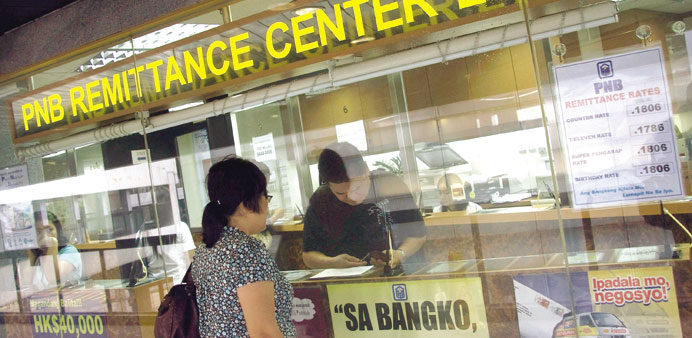A Filipino migrant worker sends money back home at a remittance centre in Hong Kong. Cash remittances from Filipinos working overseas, which help power domestic consumption, rose 9.1% to a record $2.155bn in December from a year earlier.
Reuters/Manila
The Philippines posted a record balance of payments (BoP) deficit of $4.48bn in January, when it saw its biggest-ever net portfolio outflows due to an emerging market rout, data from the central bank showed yesterday.
But authorities expect the country’s external payments position to improve in coming months as markets grow calmer over the US Federal Reserve’s plans to scale back its massive stimulus programme.
The BoP deficit in January was the widest for any month based on data from the Bangko Sentral ng Pilipinas (BSP) going back to 1999.
“The drop reflects the decline in the Financial Assets account, which has been triggered by market nervousness due to the recent heightened uncertainty in the actions of the advanced economies,” central bank governor Amando Tetangco said.
Payments for debt servicing were also a factor, Tetangco said, noting that fundamental sources of foreign exchange, including remittances, remained robust.
In January, the country registered record net portfolio outflows of $1.8bn, with gross outflows doubling to $3.1bn from December’s $1.6bn.
Its foreign reserves last month also declined to a two-year low of $78.9bn, as the BSP repeatedly intervened in foreign exchange markets after the peso fell to more than three-year lows to become the region’s worst performing currency.
The peso has clawed back some of its losses and is now down 0.5% to the dollar so far this year.
“Our view is this is also reflecting BSP’s changing monetary policy stance,” said Euben Paracuelles, economist at Nomura in Singapore.
“They are intervening in the market a bit more to try and reduce the pace of the depreciation of the currency, especially in the face of inflation risks starting to rise. Obviously if you get weaker currency, that could feed into more inflation,” he said.
The BSP has forecast the country will end 2014 with a BoP surplus of $3bn, or 0.9% of gross domestic product (GDP), narrower than the previous year’s $5.1bn surplus.
It also estimates a current account surplus of $10.4bn, or 3.3% of GDP, in 2014, narrower than expectations for a $11.1bn surplus in 2013, due to imports needed for rebuilding after a typhoon.
The BSP has yet to release the breakdown of the 2013 BoP surplus.
At its last policy meeting on February 6, the central bank left interest rates unchanged, defying some economists’ expectations of a hike. But it warned against a weaker peso and traders believe a rate rise might come soon.
Cash remittances from Filipinos working overseas, which help power domestic consumption, rose 9.1% to a record $2.155bn in December from a year earlier. Remittances for all of 2013 climbed 6.4% from the previous year to a record $22.76bn.

